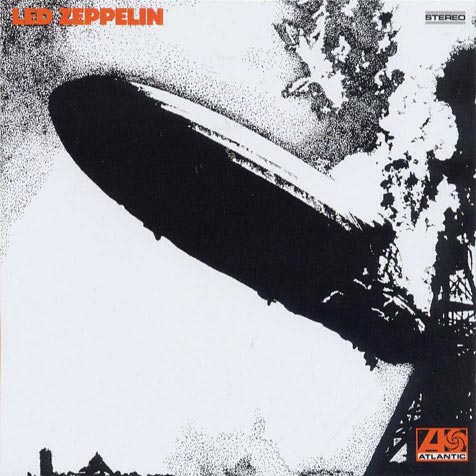Anyway, I love a good eponymous album. Artists and record companies choose to release them for a variety of reasons, from the establishing of brand to the desire for a clean state to sheer bloody laziness. So here, for entirely arbitrary reasons, are six eponymous albums that bring me joy.
Rodrigo
y Gabriella
I
was on the phone one day outside Fopp in Manchester when I heard this kick ass
Flamenco version of Metallica’s ‘Orion’. I went back inside, walked up to a
member of staff and all but demanded he tell me who was on the stereo. He gave
me a look and said, “This is Rodrigo y Gabriella.” as if I was the last person
on Earth to have heard.
While
the Metallica and Led Zeppelin covers hook you in, these are merely a gateway
to the rest of the album. It’s incredible how much of a racket two people can
generate using nothing but a couple of Spanish guitars, an energy they more
than manage to match live. A vibrant album, rhythmic and pounding, whenever I
need a kick start to the day instead of espresso I plug straight into ‘Rodrigo
y Gabriella’.

Portishead
Of
all the albums to come out of the Bristol scene in the late 90s, Portishead's
second album most closely approximates the sound that triphop seemed to be
trying to achieve. Darkly it broods, a great haunted house of an album, full of
long shadows and creaking floorboards and discord lurking around every corner.
Yet like any good ghost story, its effect is spellbinding and finds its perfect
complement in Massive Attack's Mezzanine, that other totem of triphop. Largely
neglected, like the middle child that it is: for me their best.

Elastica
Unlike
triphop, Britpop seemed to pass from fashion to fad in the blink of an eye.
While Pulp and Blur kept perhaps their best albums until after the cliché had
calcified, Elastica's eponymous debut represented the strongest release that
Britpop had to offer. More akin to the spirit of punk, 'Elastica' strains at
the edges with tight, two minute tracks, its sixteen songs galloping to a conclusion
in a little under forty minutes. And as it careers along, the influence of the
Clash, the Slits, even early Chumbawamba (Jimi
Hendix and Thin Lizzy) ooze out of every chord. A brilliant beginning, but
sadly Britpop's best and brightest burned out far sooner than they ought.
Still, it's one classic album more than most bands ever achieve.


Bob
Dylan
As
an evangelical Bobcat, Dylan's first album is something of a curiosity to me.
Recorded in 1961 when he was just 20, 'Bob Dylan is a entirely different beast
to its 1963 follow up, 'The Freewheelin' Bob Dylan'. While the latter showcases
Dylan's emerging genius with some of his greatest compositions, his debut is an
album consisting largely of folk standards he had rarely played before, the arrangements
mainly purloined from other musicians he knew from playing in and around
Greenwich Village. Only two of the thirteen tracks are written by Dylan.
Talkin' New York is ok, but it is Song to Woody, his eulogy to Woody Guthrie,
that is the album's stand out track and a warning of the creative explosion
that was about to go off in Bob's head. Dylan immediately rejected the album as
mistake, but everyone has to start somewhere. Not his best, but certainly not
his worst (see 1979-1988), and I still know every damm word.

Led
Zeppelin
In
the 1970's the eponymous album was very much in vogue. From that one decade
alone I could chose half a dozen albums. Yet my roots are with heavy metal and
heavy metal's roots lie with Led Zeppelin's tectonic debut. It's perhaps a
little hard to imagine nowadays, when metal has become mainstream and
fashionable, what effect 'Led Zeppelin' had when it was first released. 'Good
Times, Bad Times', 'Dazed and Confused' and 'Communication Breakdown' must have
sounded like communiqué's from another planet, like the premier of Beethoven's
'Eroica' or the opening snare shot of 'Like a Rolling Stone'. Forty years on
and it sounds like a blues album when compared with the thousand and one bands
that Led Zeppelin spawned, along with Black Sabbath and Deep Purple. Yet few of
the imitators can even approach 'Led Zeppelin' and it's sequels for sheer
unadulterated class.

The
Good, The Bad and The Queen
Ok,
so this one is a bit of a cheat, as the band
claimed to have no name. Yet iTunes lists the album as The Good, The Bad and
The Queen - The Good, The Bad and The Queen, so let's go with it.
The
Good, The Bad and The Queen represent that rarest of musical entities, the one
album band. Comprised of Damon Albarn, former Clash bassist, Paul Simonon,
former Verve guitarist, Simon Tong, and Nigerian drummer, Tony Allen, The Good,
The Bad and The Queen's only album was released in 2007. Zeitgeist is a much
overused word and yet the album does perfectly capture the mood and atmosphere
in Britain at that moment in time. The spectre of Iraq is never far away and
the approaching recession hangs like a bank of brooding grey cloud on the
horizon. "Friday night in the kingdom of doom", from 'Kingdom of
Doom', is such a perfect opening line that I nicked it and used as the opening
line to a short story. And while the later Blur albums are brilliant and The
Gorillaz ok, for me this is the best thing that Damon Albarn has yet done.

No comments:
Post a Comment